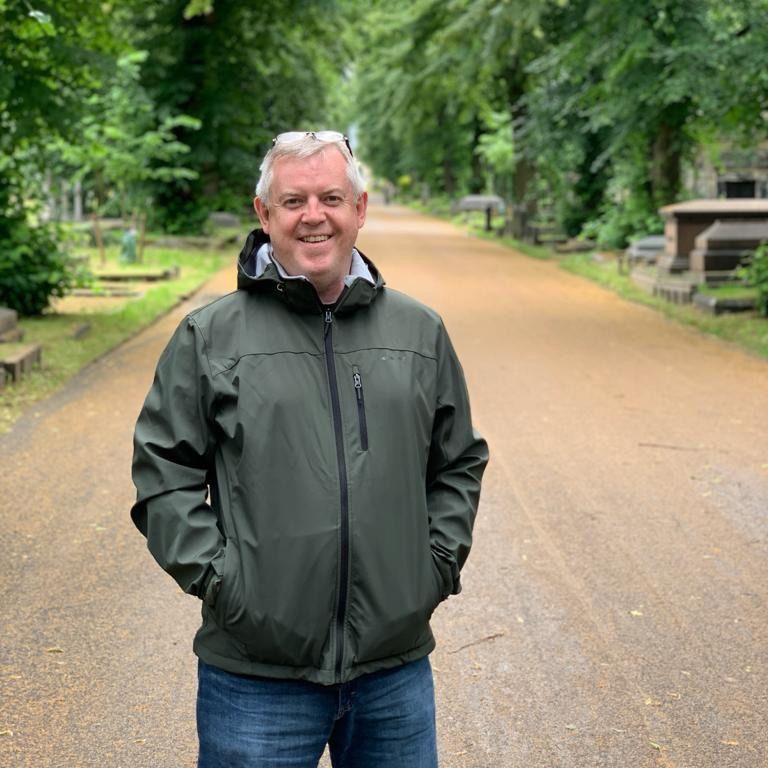Belfast born entrepreneur and retired school teacher Charlie Lord wants to give American kids the opportunity to receive their college education in Ireland.
Lord is pursuing that goal as a member of a subcommittee operating out of the The Irish Diaspora Center of Havertown, Pennsylvania, that, Lord said, is looking to “build bridges between the United States and Ireland through the medium of education.”
Lord explained that his original “motivation for coming to the United States was just really to see what else there was in the world.” He continued, “You know, I was young and Belfast was a very troubled place. I was a school kid, going to school in the 1970s and it was a very troubled city, and region. I was a teenager in the 80s. So by ‘87, I thought maybe there's something else in the world. So, in my mind, as long as it was an English speaking country, it could have been Canada, whatever, it ended up being the United States.”
Lord, who had already earned a four year business degree in England, made his way to the U.S.A., settling in Philadelphia. He continued his education, adding a Masters Degree from Temple University, while working as a teacher at Havertown High School in the Philadelphia suburbs.
As luck, or perhaps providence would have it, Lord landed in “a township that is called the 33rd County.” Perhaps in deference to the New Yorker on the other end of the phone, Lord acknowledged that “lots of places do this, like Rockaways would do it, I'm sure that McLean Avenue (would too.)”
Details from the Irish Memorial, depicting the Great Hunger in Ireland and the immigration to America. ☘️🇮🇪☘️ #art #sculpture #irish #irishmemorial #findinphilly #glennagoodacre #stpatricksday #publicart #assocpublicart #artpup #philadelphia #philly #phi… https://t.co/DHchNpJVPP pic.twitter.com/c96ZsjHDaq
— James J. Kelly (@james_jkelly14) March 15, 2023
“But here in Philadelphia,” Lord emphasized, “it's (Havertown) the 33rd County, because that’s where so many Irish immigrants came over in the 80s, you know, obviously I was one.”
In 1995 Lord started Celtic Clothing, taking knowledge he had gleaned while working for a company that provided clothing to emergency services, paramedics and firefighters.
“I was doing a lot of trade shows and traveling a lot around the United States,” Lord told the Irish Echo. The entrepreneur in him realized he could apply “the same idea, different market,” strategy and that he could aim for the Irish American audience, and so, Celtic Clothing was born.
The area’s “Irishness” played an important part in Lord’s decision to start the new venture. “When I was looking at my class lists,” Lord noted, “there'd be so many Irish names and the kids would come in in their GAA tops.”
🇮🇪🇺🇸 Citizenship Day: This Saturday, June 10th 🇮🇪🇺🇸
— Irish Diaspora Center (@icphila) June 6, 2023
Do you have a grandparent born on the island of Ireland? If you answered yes, then you are eligible to apply for Irish Citizenship (through a Foreign Birth Registration). pic.twitter.com/ENDLTtCxZS
Having served as his school’s web design teacher, Lord’s new venture dovetailed nicely with his interest in the ever burgeoning field of computers and computer retail, and Lord decided, “you know what? I’m going to take this thing online.”
“But here in Philadelphia it's (Havertown) the 33rd County, because that’s where so many Irish immigrants came over in the 80s, you know, obviously I was one.”
The success of Celtic Clothing allowed Lord to retire from teaching early to concentrate on the business and it no doubt afforded him the time to build those educational bridges.
Lord says that the program has secured 25 scholarships, noting that University College Cork, University College Limerick, University College Galway, Dublin City University, and Queen's University Belfast, are all participating in the program.
Far from being a one-man-show, Lord is quick to point out that this enterprise is a team effort, naming just some of those involved.
“John McTeer from Donegal, he works in the insurance industry. Liam Kelly, who is the CEO of a $2 billion a year company. His wife, Helen. Kevin Kent, who's a lawyer, he's our legal.”
📚 Wanna hear a great IDEA? The Irish Diaspora Education Alliance has secured reduced fees for Irish-American students to attend an Irish university. ☘️
— Irish Chamber Philadelphia (@IABCNPhila) September 13, 2023
🎓 Come to The Irish Center in Philadelphia on 19th September to learn more! @ICPhila @IrishCenterPHL @IABCNPhila #IDEA pic.twitter.com/sGAYwDM4pG
With the team in place, Lord explained the genesis of the project.
“What we're doing is that we see these kids born in the United States, to Irish parents or Irish grandparents, so therefore they're entitled to Irish citizenship, and Irish passports.”
“They are categorised with the international students and have to pay like $20,000 a year, right? $22,000.” “These are Irish citizens,” Lord explained, “and they shouldn't be categorised with the internationals.”
Children born outside of Ireland are automatically considered Irish citizens If either parent was born in Ireland and was an Irish citizen at the time of their birth.
The committee is not expecting to get the American-born students the same rate as the Irish-born but they would like to see them categorised in the same way that say, a German or French student would be.
The group has taken what Lord called, “a two pronged approach. One was to try and get legislative change in Dublin,” Lord said. “So we got a meeting with the Minister for Education, it's a very high level cabinet level meeting.
Knowing the political route, “would be the tough nut to crack,” the group also approached the universities directly, eventually landing the afore-mentioned 25 scholarships from the five universities.
This effort differs from the well known “semester abroad” programmes common to American colleges in that the intent is for the prospective students to complete their full degree in Ireland, as opposed to just that single semester.





